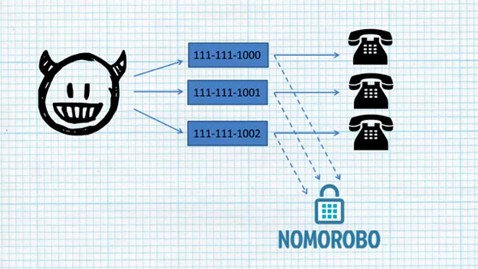FTC Contest Winners Hang Up Robocallers

Image credit: YouTube
You've probably been robocalled. You answer the phone and some prerecorded message is already in full stride trying to sell you something.
Last August, the Federal Trade Commission launched the Robocall Challenge, prompting individuals, teams, and small corporations to submit their solutions for stifling illegal and unwanted robocalling. This week, the winners were announced.
The FTC declared a tie for the overall winner category. The award and cash prize of $50,000 was shared between Serdar Danis and Aaron Foss. Their submissions, titled "Robocall Filtering System and Device with Autonomous Blacklisting,Whitelisting, GrayListing and Caller ID Spoof Detection" and "Nomorobo," respectively, both utilize a CAPTCHA-style test to prevent illegal calls from ringing through, as well as a technology to "blacklist" robocaller phone numbers.
Danis's proposal would deploy software in the form of a mobile phone app, a separate electronic device in a user's home, or a feature of a provider's telephone service to analyze and block robocalls. Foss's proposal is a cloud-based solution that would use "simultaneous ringing," which intercepts all calls and allows desired or approved incoming numbers to be routed to a second telephone line.
"The solutions that our winners came up with have the potential to turn the tide on illegal robocalls, and they show the wisdom of tapping into the genius and technical expertise of the public," Charles Harwood, acting director of FTC's Bureau of Consumer Protection, said in a statement. "We're hoping these winning proposals find their way to the marketplace soon, and will provide relief to millions of American consumers harassed by these calls."
Daniel Klein and Dean Jackson from Google were also chosen for the Robocall Challenge Technology Achievement Award, the non-cash prize, large corporation category, for their "Crowd-Sourced Call Identification and Suppression" solution.
Google currently offers a mobile phone spam solution.
The company's Google Voice service includes options to tag certain numbers as spam so that the calls or texts are redirected to a spam folder or voice mailbox, never ringing to your mobile phone. The Global Spam Filtering option can also automatically redirect calls, texts, and voicemails from any of the numbers in the Google database that have been identified as spam. Google Voice can operate on your current mobile phone number or act as a second line to forward calls to.
Sept. 1, 2009, marked the beginning of the current regulations against most prerecorded telemarketing calls. Robocalls that are considered to be "purely informational" are the legal exception to robocall regulations.
According to the FTC, "calls to let you know your flight's been cancelled, reminders about an appointment, or messages about a delayed school opening," are all considered legal examples of robocalling. So are those political campaign calls.